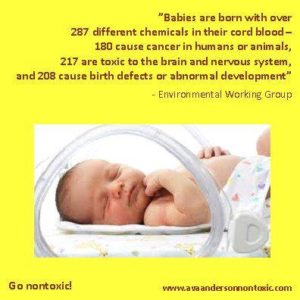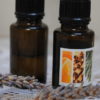Ingredients Are Important.
While researchers are still chasing down the effects of specific chemicals, there’s been enough information to make people pause and think twice before applying a product. An example that recently hit the news was the “baby-powder case.” Covering the story, Washington Post wrote the headline, “Johnson & Johnson ordered to pay $4.7 billion to women who say baby powder gave them cancer.”
This growing news and research reminds us to be aware of what is around, on, and in our bodies. I’ve covered much of that in the previous month’s blog as well as “Minimize the Toxins in Your Home.”
Not too many people question the fact that the food you put in your body can dramatically affect your health. However, not many realize the implications of the products you put on your body! 
For cosmetics, it’s important to remember they do not go through a premarket approval. That also includes shampoos, conditioners, and other personal-care products. Some cheap ingredients/chemicals are used that have never been tested on our health, which is why some sickness and diseases have started to be linked to the products we are using everyday on our bodies.
A current example: the FDA is looking into WEN by Chaz Dean Cleansing Conditioner for reports of hair loss. From the FDA report:
“Up to November 15, 2016, the FDA has received 1,386 reports from consumers. When the FDA inspected the manufacturing and distribution facilities for these products, we learned that consumers had reported reactions in more than 21,000 complaints submitted to Chaz Dean, Inc. and Guthy Renker LLC, the companies that market and manufacture the products.”
All Ingredients Are Important.
Before we keep moving, let’s think about one thing that many people forget. Natural ingredients can still cause irritation. Some are very sensitive to extracts in shampoos, which can cause itching. Others have a hard time with beeswax, or don’t forget about almond/nut oils in lotions.
What to do? Keep it simple. Know your products.
I’m often saying that you could go crazy trying to memorize the different chemicals in products or ingredients in food. So don’t.
Really. Finish using the products you have. There’s no need to waste money and stress yourself out. As you run out, do some quick research on the product and alternatives by visiting the manufacturer’s website and searching EWG’s Skin Deep Cosmetic Database. You might find your favorite is a keeper or you might want to try a new one like Purehaven or doTERRA products.
If you’re in the store, read the label. If it looks like a chemical, it is probably a chemical. Consider trying something else. You can also use EWG.ORG site to check if the product you want to buy rates as non-toxic.
Bring this all together: whether a personal-care product is traditionally or naturally produced, you’ll benefit from knowing and choosing what you’re putting on and around your body. Read the label and learn what’s best for you. If you get lost, you can always contact me.



![z31[1]](https://simplywholebydevi.com/wp-content/uploads/2018/06/z311-100x100.jpg)












